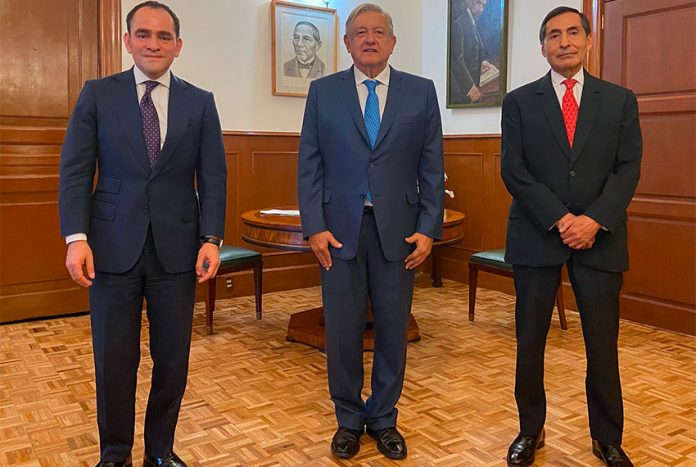President López Obrador has named Rogelio Ramírez de la O, a consultant who lacks public-sector experience, as a replacement for Finance Minister Arturo Herrera, who is being moved to run the country’s central bank.
Flanked by the two officials, López Obrador in a video on Wednesday hailed Ramírez as a “master of the economy . . . experienced, serious.”
Ramírez, 72, is director-general of Ecanal, a private Mexican consultancy, and holds a doctorate from Cambridge. He is a longtime ally of the president and had been earmarked to become finance minister if López Obrador had won elections in 2006 and 2012.
He had, however, turned down invitations to take the portfolio after López Obrador became president in 2018.
The peso eased fractionally after the announcement. Mexico’s financial markets have been buoyed this week following midterm elections on Sunday, in which López Obrador failed to hold on to his two-thirds majority in the lower house of Congress, denying him the ability to change the constitution at will.
Some analysts were sceptical of the choice. “He has literally zero practical experience,” said Eduaro Suárez, vice-president for Latin America economics at Scotiabank.
Ramírez is not expected to oppose López Obrador’s economic vision, especially in energy, where he favours state-run oil and utility companies over private investment.
The president reiterated there would be no change to his priorities: no debt, tax or energy price increases, and “the poor come first.”
That meant “he’s going to have to continue juggling,” said Gabriela Siller, head of economic analysis at Banco Base. López Obrador has slashed spending to the bone and spent rainy-day savings to pour resources into pensions, scholarships and pet infrastructure projects.
However, Mexico’s economy is rebounding from Covid-19 and is expected to grow as much as 6.5% this year, after falling 8.5% in 2020.
“If he’s taking over 2 1/2 years into the president’s administration, Rogelio must know the game plan for public spending very well,” said Alonso Cervera, chief economist for Latin America at Credit Suisse. “He will very likely enable the president’s ideas regarding the energy sector.”
He said Ramírez was likely to draw up the budget, which must be presented by September. Also pending is a tax reform which top government sources said would not contain wealth or inheritance taxes.
Alejandro Díaz de León, current central bank governor, is scheduled to leave his post in December. López Obrador said he had announced his replacement now to avoid market jitters.
If confirmed by the Senate, Herrera — who counts former Federal Reserve chair Ben Bernanke among key influences — would complete a line-up of non-Banxico insiders on the central bank board. López Obrador had stressed the need for a “moral economist” at the helm.
Herrera is well-known to investors, but his closeness to the president makes his ability to uphold the central bank’s autonomy less clear.
Díaz de León mounted a stern defence last year when legislators had pushed a bill that would have forced the central bank to absorb dollars that banks were unable to repatriate.
“I think Herrera has proven to be prudent, and has earned markets’ trust,” Suárez said. But he added: “He will have to work hard to signal strong independence from the government.”
© 2021 The Financial Times Ltd. All rights reserved. Please do not copy and paste FT articles and redistribute by email or post to the web.
